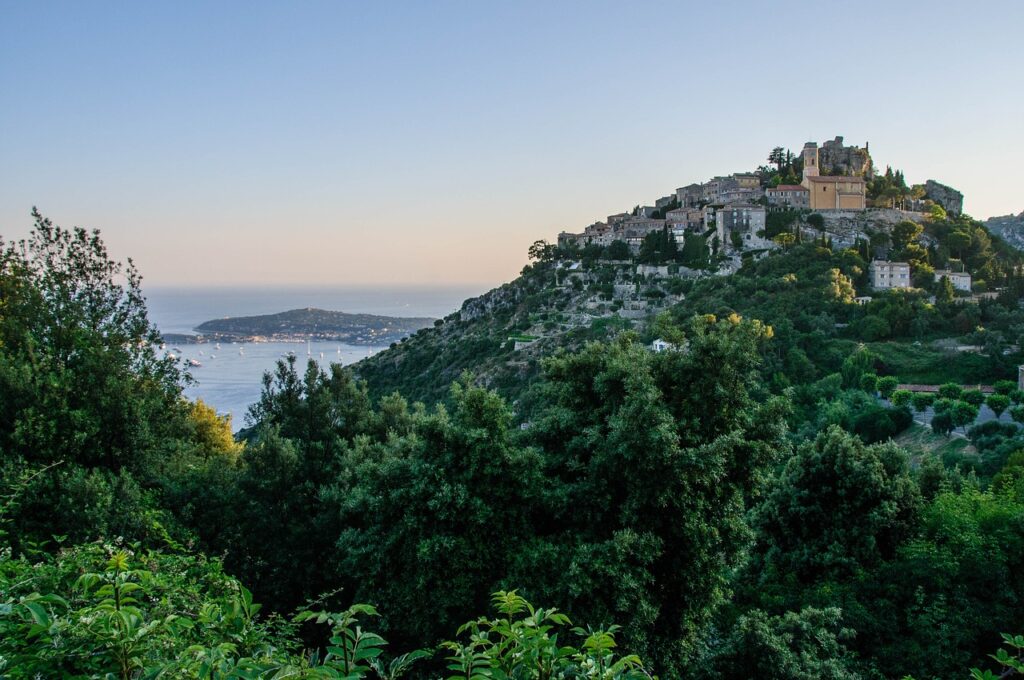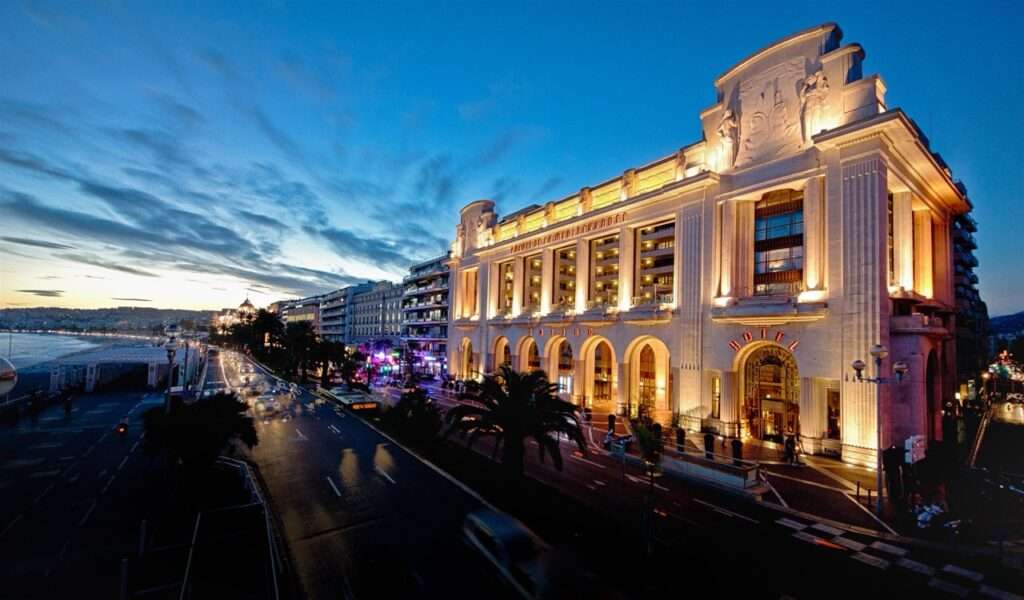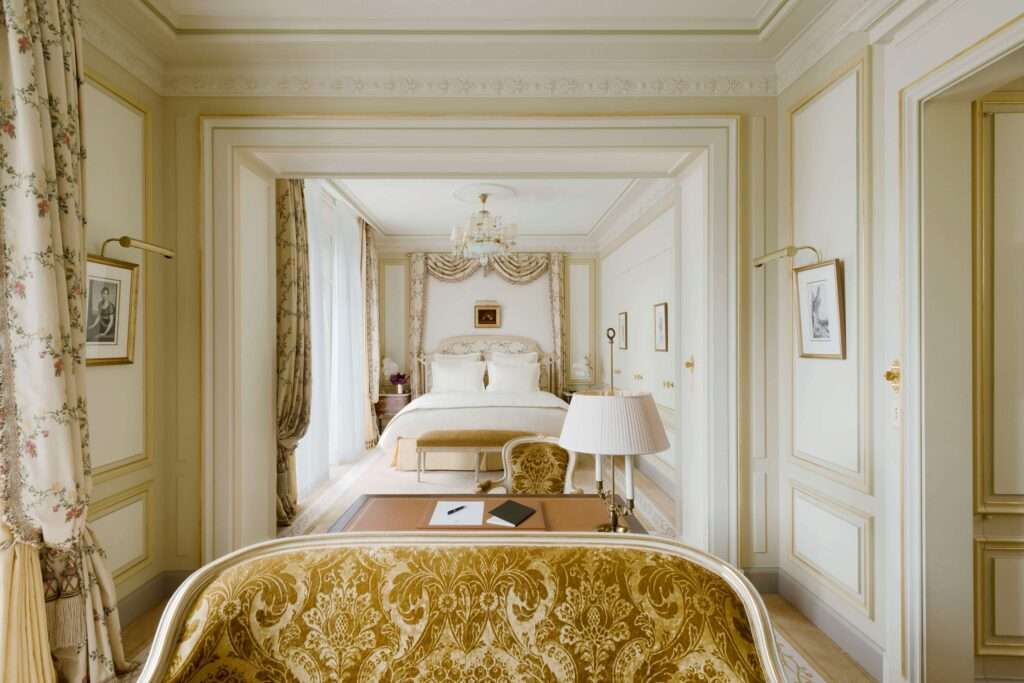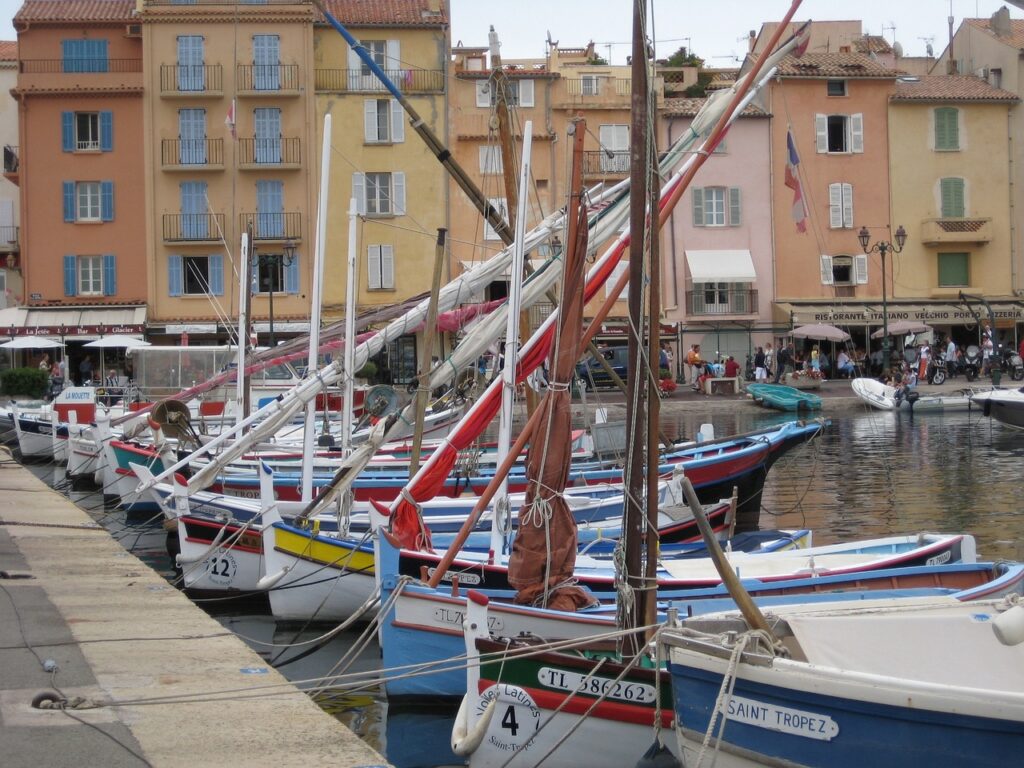Everything You Need to Know About Traveling to France: FAQs and Tips
Embarking on a journey to France promises a thrilling blend of rich history, vibrant culture, and exquisite cuisine. The country, often dubbed as the ‘birthplace of gastronomy’, presents a unique blend of diverse landscapes, ranging from the snow-clad peaks of the Alps to the azure waters of the French Riviera. Every city, town, and village in France boasts its distinct character and charm, making each visit an exclusive experience. Whether it’s the intriguing allure of Paris, the rustic appeal of Provence, or the coastal allure of Normandy, France offers a multitude of experiences that cater to every traveler’s tastes and preferences. Discover the best time of year to visit France as well as necessary travel documents for visiting France in our comprehensive guide.
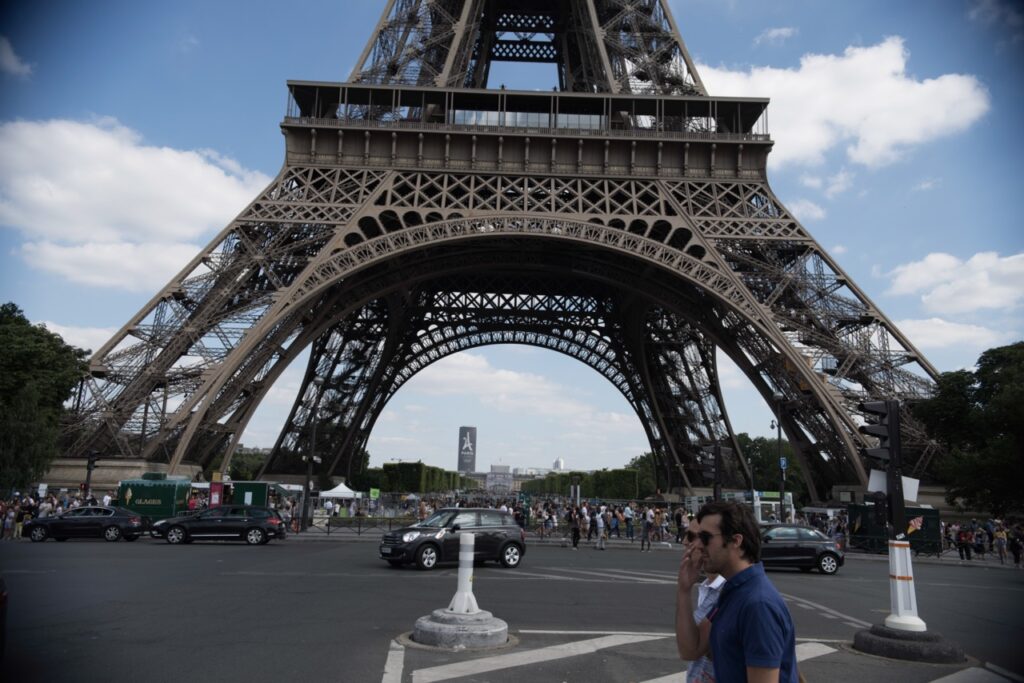
Tip 1: What are the top attractions in France.
Recognized for its rich cultural heritage, France effortlessly blends a deep history, exceptional architecture, and world-class art. Iconic landmarks such as the Eiffel Tower in the heart of Paris, the resplendent Palace of Versailles, the world-renowned Louvre Museum, the glamorous French Riviera, the mystical Mont Saint-Michel, and the majestic châteaux of the Loire Valley are among the top attractions that offer visitors an immersive experience into France’s cultural panorama. Remember to wander the quaint streets of Montmartre, relish the delectable French cuisine including classics like baguette and croissant, and be captivated by the stunning landscapes that the picturesque French countryside, like Provence and Normandy, have to offer.
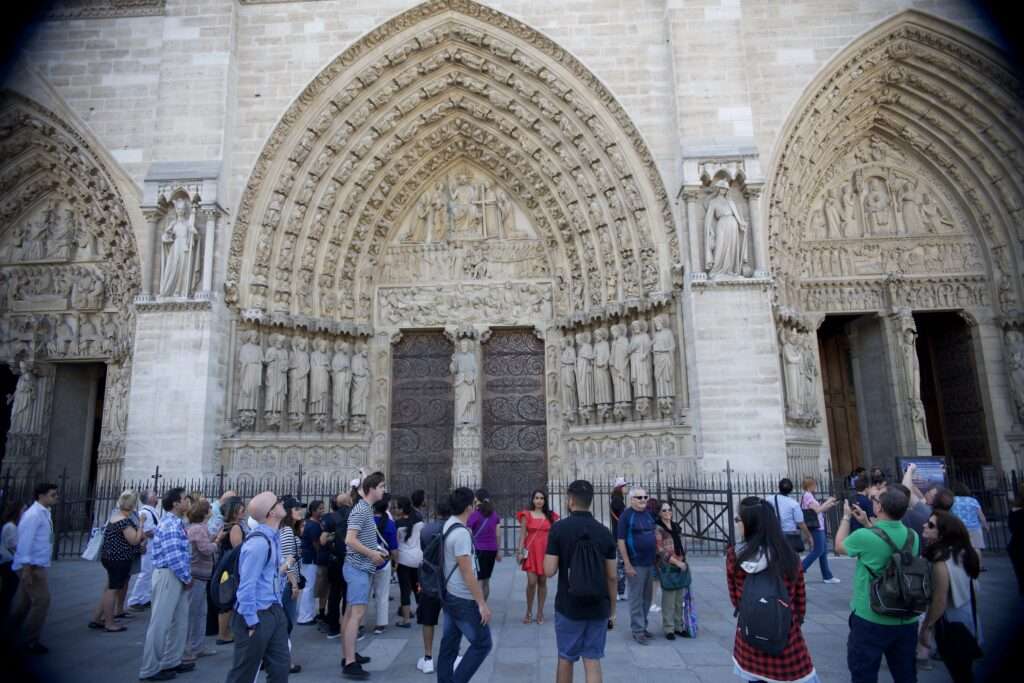
Notre Dame, Paris
Tip 2: Why Travel to France?
There are countless reasons to visit France. For those fond of history and art, France houses some of the world’s most famed museums and galleries, including the Louvre and Musee d’Orsay. The country is also known for its architectural marvels, like the gothic Notre-Dame Cathedral and the Palace of Versailles. For nature enthusiasts, France presents a spectrum of natural beauty from the breathtaking French Alps to the sun-soaked beaches of the French Riviera. Additionally, France’s reputation as a culinary paradise is hard to rival. From enjoying a croissant at a Parisian cafe to savoring a full-bodied Bordeaux in a vineyard, the gastronomic experiences in France are limitless. Moreover, the French are known for their hospitality and joie de vivre, adding an extra layer of charm to the travel experience.

Louvre Museum, Paris
Tip 3: Essential Travel Documents for visiting France
Ensuring you possess all the necessary travel documentation is a crucial part of trip preparation. For entry into France, a valid passport is mandatory. Depending on your nationality and the duration of your stay, you may also require a visa. If you’re an EU citizen, you can enter using your National Identity Card. It’s also advisable to have a copy of your travel insurance policy and any other relevant documentation, such as driver’s license if planning on driving. Lastly, remember to keep a digital copy of all these documents as a safety measure.
Tip 4: What is the best time of year to visit France?
The best time to visit France largely hinges on your individual interests and preferences. Summer (June to August) remains a hot favorite among tourists, with its warm weather, bustling festivals, and vibrant events. However, be ready to navigate through crowds at popular landmarks like the Louvre Museum or the Eiffel Tower. For a more serene experience, consider the shoulder seasons of spring (April to May) or autumn (September to October). You’ll still enjoy a pleasant climate and get to relish the French beauty sans the crowds. Winter (December to February) is perfect for those who revel in skiing or winter sports in the French Alps. Whether it’s wine tours in Provence, beach escapades in the French Riviera, or fashion weeks in Paris, France offers a rich diversity of attractions year-round, making it easy to plan your itinerary based on your personal interests and preferences.
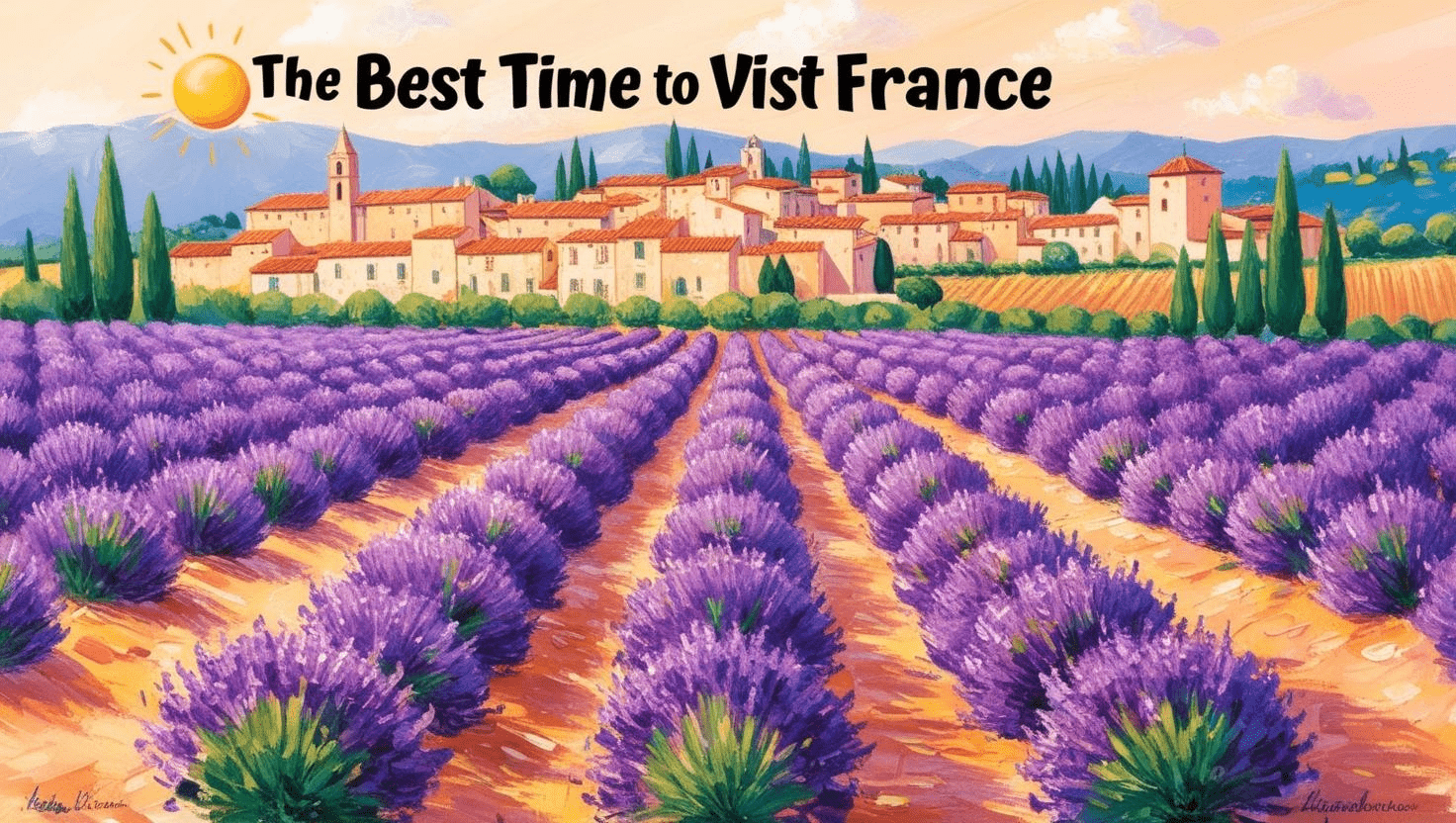
Best Time to Visit France
Tip 5: Where are the best vineyards in France?
France is globally recognized for its iconic vineyards and distinguished wine regions. Top-notch vineyards are nestled in regions like Bordeaux, Burgundy, Champagne, and the Loire Valley. Bordeaux, famous for its rich red wines, is particularly celebrated for Cabernet Sauvignon and Merlot. Burgundy is renowned for its esteemed Pinot Noir and Chardonnay wines. Champagne is the cradle of the effervescent wine that proudly shares its name. The Loire Valley, on the other hand, is famed for its diverse assortment of wines, including Sauvignon Blanc, Chenin Blanc, and Cabernet Franc. Each region provides unique wine tasting experiences and breathtaking landscapes, making them must-visit destinations in your French travel itinerary.
Tip 6: Who serves the best coffee in Paris?
Every corner of Paris is steeped in iconic café culture, making it a paradise for coffee lovers. Nestled among its world-renowned landmarks like the Seine, the Louvre, and the Eiffel Tower, you’ll find a myriad of chic cafés serving the city’s best coffee. Among these, Café de Flore, Les Deux Magots, and La Caféothèque stand out as iconic establishments, loved by tourists and locals alike. These institutions have been brewing coffee for decades, making them an integral part of the Parisian café society. From intense espresso and creamy café crème to aromatic café au lait adorned with intricate latte art, every coffee connoisseur will find their perfect cup. And what would a French café experience be without indulging in a buttery croissant or a delicate macaron? Embark on this exploration of Paris’s café culture, and you’re sure to savor the quintessential French experience.
Tip 7: Which traditional dishes from France are a must-try?
When embarking on a culinary journey in France, don’t miss out on savoring the iconic Coq au Vin, a sumptuous chicken dish cooked in red wine. Delight your taste buds with the regional specialty of Cassoulet from Toulouse, a hearty bean and meat stew. Of course, no French gastronomic experience would be complete without tasting the classic Ratatouille from Nice or the unique flavor of Escargot, snails cooked in garlic butter. From the creamy Camembert cheese of Normandy to the world-famous baguettes and croissants, France’s traditional dishes promise an unforgettable gastronomic journey.
Renowned for its delectable French cuisine, France boasts an array of traditional dishes that are an absolute must on your culinary adventure. The iconic Coq au Vin, a sumptuous chicken stew simmered in Bourgogne red wine with mushrooms and onions, hails from the Burgundy region and is a dish you simply cannot miss. Another gastronomic delight to experience is Escargot, snails exquisitely cooked in a garlic butter sauce, a traditional dish from Burgundy and Provence. For the cheese aficionados, a platter featuring a selection of French cheeses like the creamy Camembert from Normandy, Brie, and the tangy Roquefort is a must-try. And of course, an authentic French experience would be incomplete without the pleasure of biting into freshly baked baguettes and croissants, the pride of Parisian cafes. Bon appétit!Food and Drink in France
In the realm of gastronomy, France sets a high standard. Its rich culinary tradition is steeped in history, regional diversity, and a deep appreciation for quality ingredients. Whether it’s a humble baguette or an elaborate coq au vin, French food and drink are integral to the country’s culture, offering a taste of its unique lifestyle and identity.
Traditional French Cuisine
The cornerstone of traditional French cuisine is its emphasis on locally sourced, fresh ingredients. Each region in France boasts a distinct culinary tradition, from the seafood-centric dishes of Brittany to the hearty stews of Alsace. The country’s iconic dishes, like boeuf bourguignon, ratatouille, and crème brûlée, reflect a balance of simplicity and sophistication. The French are also renowned for their cheese and bread, boasting over 1000 varieties of cheese and countless types of artisan breads. The art of French patisserie is another element of their cuisine, with pastries like croissants, macarons, and tarte tatin celebrated globally.
Popular French Drinks
When it comes to beverages, France’s reputation for quality extends beyond its food. Wine is an integral part of French culture, with regions like Bordeaux, Champagne, and Burgundy globally recognized for their exceptional vintages. Each region’s terroir gives the wine its unique character and flavor profile. Apart from wine, France is known for its cider, particularly in Brittany and Normandy, and its range of liqueurs like cognac, pastis, and chartreuse. Coffee also holds a special place in French society, whether it’s a quick espresso at the counter or a leisurely café au lait at a sidewalk café.
Tip 8: What are Popular Tourist Destinations in France
France, renowned worldwide for its rich history, diverse culture, and exquisite cuisine, offers countless destinations that attract millions of tourists each year. Whether one is a history buff, a lover of fine arts, a foodie, or simply a nature enthusiast, there is a place for everyone in this splendid country. Let’s delve into some of the most popular travel destinations in France that never fail to leave visitors spellbound.
Paris: The City of Lights
The capital city, Paris, often referred to as ‘The City of Lights,’ is undoubtedly one of the must-visit places in France. It is home to iconic landmarks such as the Eiffel Tower, Louvre Museum, Notre-Dame Cathedral, and Champs-Élysées, which are all synonymous with Paris’s charm and elegance. Beyond these enchanting sights, the city is also famous for its culinary scene, ranging from traditional French bakeries to Michelin-starred restaurants. No trip to France is complete without experiencing the magical allure of Paris.
The French Riviera
Moving towards the south-eastern coast, one arrives at the glamorous French Riviera, also known as Côte d’Azur. This Mediterranean coastline is famed for its sparkling blue waters, pristine beaches, and luxurious resorts. It is a playground for the rich and famous, with cities like Nice, Cannes, and Saint-Tropez providing a mix of natural beauty, exciting nightlife, and high-end living. The French Riviera is a perfect destination for those seeking a blend of relaxation and thrill.
The Loire Valley
For history enthusiasts and wine connoisseurs, the Loire Valley is a dream destination. Known as the ‘Garden of France,’ this region is dotted with over a thousand châteaux, each unique and steeped in history. The Loire Valley is also a major wine-growing region, offering a wide range of wines, from crisp whites to robust reds. The breathtaking landscapes, combined with the rich cultural heritage and delectable wines, make the Loire Valley a must-visit destination in France.
Tip 9: Safety Tips for Traveling in France
Embarking on an adventure to France is exciting, but it’s crucial to prioritize your safety to ensure a smooth journey. As a tourist, it’s vital to familiarize yourself with the local customs, laws, and safety measures to enjoy a worry-free vacation in this beautiful country. Respect local culture, be mindful of your belongings, and avoid secluded areas at night. Always have the contact details of your embassy or consulate. Remember to stay in touch with your loved ones regularly and inform them of your whereabouts.
General Safety Tips
While exploring France, remember to apply general safety practices. Be vigilant about your surroundings, particularly in tourist areas where pickpocketing is prevalent. Secure your belongings and do not flaunt valuable items in public. Use well-lit and populated routes when navigating the city at night. It’s also advisable to travel in groups whenever possible. In case of any suspicious activity, don’t hesitate to contact the local authorities. Always keep a digital copy of your important documents like passport and visas in case of loss or theft.
Healthcare and Medical Emergencies
When it comes to healthcare, France boasts an excellent system. However, it’s advised to get a comprehensive travel insurance policy that covers healthcare to cope with any medical emergencies during your trip. Always carry a basic first aid kit and necessary medications with you. If you have a pre-existing medical condition, bring enough medication for your stay and a copy of your prescription. Familiarize yourself with the location of the nearest hospitals and pharmacies to your accommodation. In case of a medical emergency, call the EU-wide emergency number, 112. It’s always better to be prepared than caught off guard.
Tip 10: Know the currency in France
The official currency in France is the Euro. It is wise to have some Euros on hand when visiting France for small purchases, such as snacks or souvenirs. While credit cards are widely accepted in most establishments, having cash on hand is always helpful, especially in smaller towns or markets.
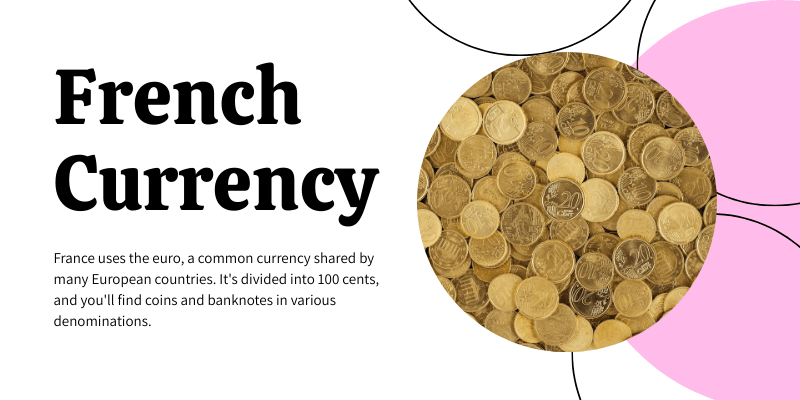
Tip: Euro is used in France
As when you travel internationally anywhere it is wise to notify your bank or credit card company about your travel plans to avoid any issues with using your cards abroad. Additionally, be aware of any foreign transaction fees that may apply when using your cards in France. It is also wise to carry a mix of payment methods, such as cash, credit cards, and a travel money card.
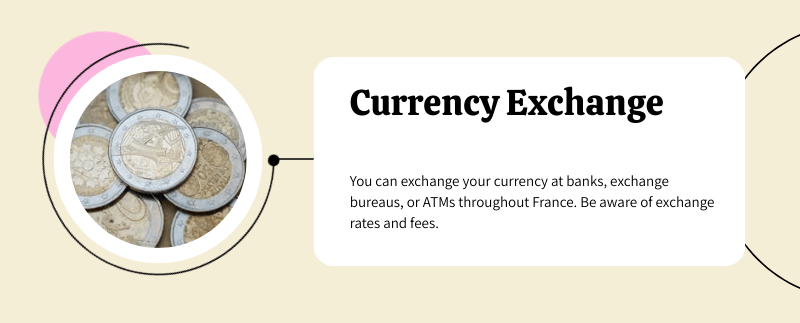
Currency Exchange in France
Conclusion: Making the Most of Your Trip to France
As we wrap up, it’s crucial to note that every trip to France is an opportunity to immerse oneself in a rich tapestry of culture, history, and gastronomy. From the breathtaking views of the Eiffel Tower in Paris to the tranquil vineyards of Burgundy, every experience promises to be memorable. Make the most of it by embracing the local customs, savoring the unique flavors of French cuisine, and soaking up the awe-inspiring landscapes. Additionally, don’t forget to explore beyond the typical tourist trails. Hidden gems, such as the charming village of Giverny or the rugged coastline of Brittany, are waiting to be discovered. By doing so, you’ll not only gain deeper insights into the French way of life but also create unforgettable memories.


